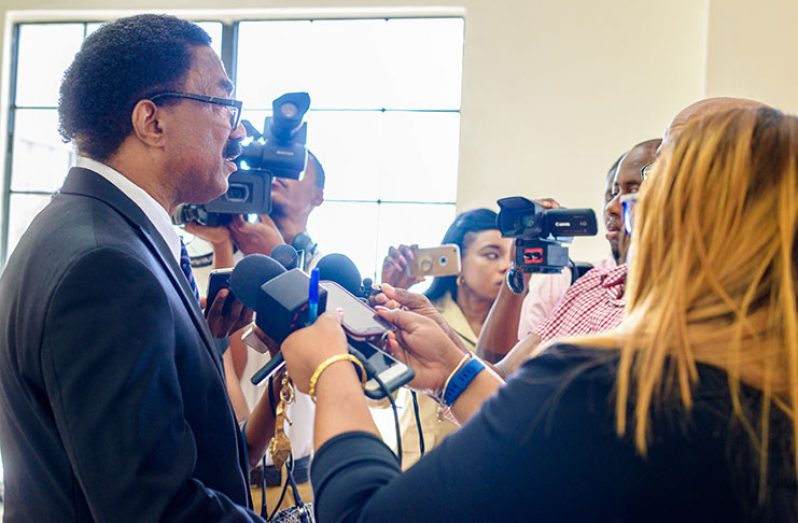–AG says come what may, Guyana will have own law school
GOVERNMENT is working assiduously to ensure that a local law school is established here, Attorney-General and Minister of Legal Affairs, Basil Williams said Monday.
Speaking on the sidelines of an anti-corruption, fraud and bribery training programme which opened Monday at the Police Training Centre on Camp Road, Williams told reporters that work is still ongoing on the feasibility study for the institution.
“We are working on a shareholders’ agreement, the definitive agreement, and the business plan, which would include the feasibility study, and we hope to have that before the end of this month,” he explained, adding that upon completion, “we will invite the Council of Legal Education (CLE) team to come to us, or if we have to, go to Trinidad to examine it.”
Williams explained that Guyana’s actions with regard to the law school is grounded in a study conducted by a Canadian-funded programme done through the Impact Justice Programme. The study assessed legal education in the Region, and a report with the findings and recommendations has been circulated to stakeholders.
As part of its finding, the Impact Justice Programme recommended, among other things, that law schools should be established in Antigua, Guyana and Jamaica. “So, we are bolstered by that; we really need a law school in Guyana,” Minister Williams said, as the tuition fees for Guyanese students attending the Hugh Wooding Law School in Trinidad have been increased to TT$97,000 or just over G$3M.
“That is only for tuition,” he said. “You still have to live and exist in Trinidad. We are working on it, especially at this time how Guyana is poised. We would need lawyers to deal with oil and gas, the ‘Green State and Economy’ so we have a lot of capacity to build.”
Asked whether the report recommended that the CLE be more of a regulatory body as opposed to one that is running the local law school, Williams answered in the affirmative. “We already see them as largely being in the realm of accreditation; not to run law schools in the Region on a day-to- day basis,” he stated, while adding that the recommendations are now being assessed by stakeholders.
Said he, “Well, the report is out; it has been circulated to the various governments and attorneys-general. I have a copy, and I am going through it. I have to take it to Cabinet.” What he could not say definitively, however, is how soon the recommendations contained in the report are likely to be accepted, but noted that the CLE is a regional body, and certain procedures must be followed before decisions are taken.
FULLY CAPABLE
This notwithstanding, the Attorney-General said Guyana has the capacity to run its own law school, and said he is fully in support of the recommendations that the CLE should be a regulatory body, and not be involved in the day-to-day operations of the law school.
Explaining the situation in which Guyana is in presently, Minister Williams said, “Because of our experiences right now… We have been reduced to 25 students; we used to have Jamaicans, Belizeans, and others studying with us…
“The decisions of the CLE have excluded them, and Trinidad and Jamaica have been churning out lawyers, over 200 a year, while we are limited to 25 and under.”
Describing the cost imposed on the 25 Guyanese students as prohibitive, he said:
“We need to ease this hardship on our students and let people have an access. A country cannot go wrong having people who have been exposed to law. We hope that it can lead to a more orderly and law abiding society.”
Stakeholders of the project have already acquired a building plan and design for the facility, which is proposed to be 50,000 sq. ft with three floors. The law school will be named the Joseph Oscar Fitzclarence (JOF) Haynes Law School, and will be sited at the University of Guyana.
The project comes after some two decades of lobbying for an alternative to the Norman Manley Law School in Jamaica, the Hugh Wooding Law School in Trinidad and Tobago and the Eugene Dupuch Law School in The Bahamas.
The JOF Haynes Law School is being established through a Public-Private Partnership among the Government of Guyana, the Law School of the Americas (LCA), and the University College of the Caribbean (UCC), and will add to the existing options available to holders of a Bachelor of Laws (LLB) degree, and who intend to pursue their Legal Education Certificate (LEC).
A timeline of 2018 was set for the establishment of the local institution, and according to the attorney-general, whether or not the timeline is met, a local law school will be established.












